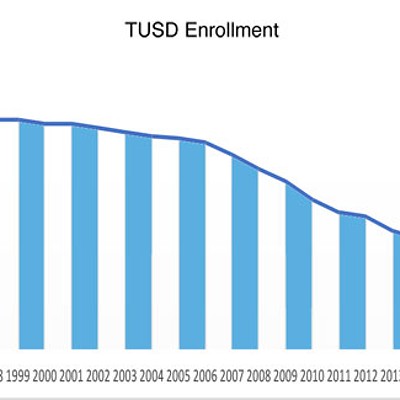THE END IS NIGH
State Rep. Daniel Patterson, the embattled Democrat who represents Tucson's Legislative District 29, survived an initial vote to expel him from the Arizona House of Representatives earlier this week after the release of a damning ethics report that grew out of a scuffle between him and an ex-girlfriend.
Democratic State Rep. Steve Farley of Tucson moved to adopt the report's expulsion recommendation, but before that could come to a vote, ethics chair Ted Vogt (R-Tucson) made a substitute motion to give Patterson a week to respond to the ethics report.
The report, which was released to the public on Monday, April 2, goes beyond the Patterson domestic-violence allegations that landed him in Tucson City Court and spawned the investigation. It cites a long and varied list of new allegations to support its recommendation that Patterson be thrown out, including:
• Verbal abuse, harassment and physical threats toward those who disagree with him.
• A broad-based distrust and fear of him by members of the Legislature, staff and lobbyists.
• A legacy of ignoring House rules, decorum and professionalism.
• Continued violation of court orders.
• A pattern of dishonesty and lying.
• Frequent marijuana use.
• The possibility that he manipulated former campaign manager and ex-girlfriend Georgette Escobar into recanting her domestic-violence allegations via Facebook.
• Seeking sex from a lobbyist in exchange for his vote.
In a conversation with the Tucson Weekly after the report was released, Patterson vehemently denied some of the claims (including the sex-for-his-vote accusation, and speculation that he may have manipulated Escobar), sidestepped questions on others (What is "frequent" marijuana use?), and said yet others were true, but that they didn't merit expulsion. (For example, when he said he'd kick someone's ass, he didn't literally mean it.)
Patterson called the ethics investigation a politically motivated fishing expedition into his personal life, and claimed the investigator, Michael Manning, at the law firm Stinson Morrison Hecker, started with a predetermined outcome: Patterson would be lynched politically.
"Mike Manning is a political lawyer, and the idea that he would have some kind of unbiased opinion on this is a joke," he said. "House ethics rules ... allow me a chance to respond to all of these things and to cross-examine witnesses. I haven't had that opportunity."
A large portion of the report focused on Patterson's aggressive interactions with other lawmakers, staff, lobbyists and constituents, saying he harassed, intimidated and threatened people on a regular basis, especially those who disagreed with him.
"Rep. Patterson's indecorous, inappropriate, deceptive and threatening misconduct, coupled with his reputation as physically abusive and combative, is far beyond what might be expected in the adversarial atmosphere of a legislature," the report says.
The report says that Yuma Democrat "Rep. (Lynne) Pancrazi fears for her safety since the ethics complaint was filed and has 'made a habit of keeping a weapon near her when she sleeps and has requested (that) security escort her to her vehicle after hours.'"
Patterson said that while he has lost his temper at times, he has never hurt anyone, and the allegations are overblown.
"It's not my intention to intimidate anyone," he said. "I think people who know me know that I have a pretty direct approach to things at the Capitol, and sometimes, I take a strong position, but I also think there are some people at the Capitol who have some thin skins."
Patterson criticized parts of the report that relied on anonymous testimony or third-hand information, like the one-sentence claim that investigators "(were) told that a lobbyist stated that Rep. Patterson indicated that he would trade his vote on a bill for sex." He called the allegation a "blatant lie."
The House has set a new Ethics Committee meeting for April 10.
Patterson said the Ethics Committee trampled his rights by not allowing him to review the report and submit his response before it was released to the public. And he once again said he would not resign.
"The people in my district didn't elect me to resign," he said. "When the going gets tough at the Capitol, I'm going to bear down and stand up, and that's all I'm doing. And I'm doing it with respect and with the truth on my side."
House Minority Leader Chad Campbell told the press after the vote that he considered Patterson a threat.
"I want him out of his office. I want him having no contact with any staff, no access to the building," Campbell said.
BUDGET BATTLE
The U.S. House of Representatives last week passed a budget plan developed by Wisconsin Republican Congressman Paul Ryan.
The budget plan, which won the vote of all but 10 Republicans and exactly zero Democrats, is based on Ryan's blueprint for bringing spending in line with revenues—although that wouldn't happen for another half-century or so.
The Ryan plan includes a dramatic reduction in taxes for America's wealthiest residents by creating just two tax brackets: a 10 percent bracket, and a 25 percent bracket. To actually balance the budget following those cuts, Ryan promises to close a bunch of unspecified loopholes and dramatically cut future spending.
The plan also incorporates the $500 billion in Medicare cuts that Republicans spent much of their 2010 campaigns complaining about—and it goes a step further in reforming Medicare, in that seniors would have a choice of either remaining with the traditional Medicare program, or getting a voucher to buy private insurance.
While it doesn't stand a chance of passing the U.S. Senate, the Ryan budget promises to be one of the major narratives of the 2012 election cycle—and since that cycle is already under way here in Southern Arizona thanks to the special election to finish Gabrielle Giffords' term in Congressional District 8, we thought we'd check with the candidates in that race.
Only one of the Republicans competing in the upcoming April 17 primary election expressed support for the Ryan plan: State Sen. Frank Antenori said he would have voted for it, because it lowers taxes and reduces the growth of spending, which is the direction in which he wants the country to go.
Jesse Kelly, the 2010 GOP nominee who lost to Giffords, sidestepped the question on whether he would have voted for the Ryan plan, but said through a spokesman that he would vote for lower taxes and the repeal of Obamacare.
Martha McSally, the former Air Force fighter pilot and political newcomer who told the Weekly she didn't know who Paul Ryan was during a February interview, also sidestepped the question, but said through a spokesman that she "supports many elements of the plan."
Marketing businessman and UA broadcaster Dave Sitton also didn't say whether he would have voted for the Ryan plan, but he told The Skinny via email that it shared "several objectives" with his 10-point plan for jobs and the economy, including lower income taxes, fewer tax loopholes and exemptions, and a repeal of Obamacare.
Democrat Ron Barber, the former Giffords aide who will face the winner of the GOP primary in the June 12 special general election, said he would have voted against the Ryan plan, because it would be "devastating" to Medicare.
"The impact would be to end Medicare as we know it," Barber says. "The most-healthy people will go (to the private insurance companies), and the program will be left trying to serve the people with the most health needs, which will make it a more costly program and will not help solve its solvency problems down the road."















